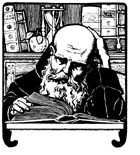
Bible-Burners
GUEST COLUMN
Tales continue to circulate about how the Catholic Church opposed translating the Bible into the vernacular. But the Church has never opposed that. After all, the Vulgate was originally translated by St. Jerome to make the Bible available in the vernacular of the day, Latin, which continued to be the lingua franca of educated Europe up to the late 18th century and beyond. Nor were the Reformers the first to translate the Bible into more modern European languages. The Catholic Church approved of Gutenberg’s German Bible in 1455. The first printed Flemish edition came out in 1477. Two Italian versions of the Bible were printed in 1471, and a Catalan version came out in 1478. A Polish Bible was translated in 1516, and the earliest English version was published in 1525. Most of these were editions of the entire Bible. Individual books had appeared in the vernacular centuries earlier. The first English-language Gospel of John, for example, was translated by the Venerable Bede into Anglo-Saxon in the year 735.
The Church didn’t object to William Tyndale’s translating the Bible into English. Rather, she objected to the Protestant notes and Protestant bias that accompanied the translation. Tyndale’s translation came complete with prologue and footnotes condemning Church doctrines and teachings. Even King Henry VIII in 1531 condemned the Tyndale Bible as a corruption of Scripture. In the words of King Henry’s advisors: “the translation of the Scripture corrupted by William Tyndale should be utterly expelled, rejected, and put away out of the hands of the people….”
Protestant Bishop Tunstall of London declared that there were upwards of 2,000 errors in Tyndale’s Bible. Tyndale translated the term Baptism into “washing,” Scripture into “writing,” Holy Ghost into “Holy Wind,” bishop into “overseer,” priest into “elder,” deacon into “minister,” heresy into “choice,” martyr into “witness,” etc. In his footnotes, Tyndale referred to the occupant of the Chair of Peter as “that great idol, the whore of Babylon, the anti-Christ of Rome.”
The Catholic response was not to burn the Bible, but to burn Tyndale’s Bible. This was an age when making your own version of the Bible seemed to be all the rage. The Reformers cut out the Deuterocanonical Books, Luther wanted to get rid of the Epistle of James as well as Hebrews, Jude, and Revelation because they didn’t agree with his theory of justification. The Reformers themselves fought about which version of the Bible was best. Zwingli said of Luther’s German version of the Bible, “Thou corruptest the word of God, O Luther; thou art seen to be a manifest corrupter of the holy scripture; how much are we ashamed of thee…!” To which Luther politely answered, “Zwinglians are fools, asses and deceivers.” At the same time Molinaeus, the French Reformed theologian, complained that Calvin “uses violence to the letter of the gospel, and besides this, adds to the text.”
You May Also Enjoy
Keep in mind St. Paul’s dire warning that heresies would of necessity come so that the genuine faith of the elect may come to light all the more strongly.
Sheldon Vanauken died on October 28 of cancer. His name graced our masthead since our…
A revealing vignette about the priorities of the Episcopal Church...

